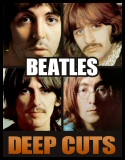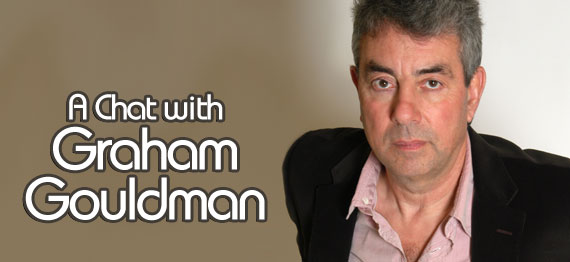
07/09/2007
Music Home / Entertainment Channel / Bullz-Eye Home
It has to be said that most Americans may not recognize Graham Gouldman's name when they hear it, but rest assured that he's one of those guys whose songwriting credits will ring a bell…and then some. The Yardbirds' "For Your Love” and "Heart Full of Soul”? That's Graham Gouldman's handiwork. The Hollies' "Look Through Any Window” and "Bus Stop”? That's him as well. Gouldman's also a founding member of 10cc, where he co-wrote immortal songs like "I'm Not In Love,” "The Things We Do For Love,” and "Rubber Bullets,” among others. You might even remember him for his work with Andrew Gold during the ‘80s, as part of Wax UK ("Bridge to Your Heart”). Or for the fact that he produced the Ramones' Pleasant Dreams album. Or…well, you get the picture: Graham Gouldman's been a busy boy. We spoke with him on the occasion of his reuniting with his former 10cc bandmate, Kevin Godley, for some new songs, but we tried to tackle as many of the above topics as possible, as well as to ask him about his other songwriting collaborators, including members of Madness, Squeeze, and…Take That? True enough.
Graham Gouldman: Hello…?
Bullz-Eye: Hello, may I speak to Graham?
GG: Yeah, speaking. Can you hold on a second?
BE: Absolutely!
GG: (Vanishes off the line, but remains close enough to the receiver that he can be heard getting off another call) Hello!
BE: Hello!
GG: How are you?
BE: I'm good.
GG: Very well.
BE: And it's a pleasure to speak with you.
GG: Thank you!
BE: We've traded E-mails a couple of times now, I guess…
GG: I guess we have!
BE: …but since it's what spurred me to ask for this interview in the first place, I guess we should start by talking about you and Kevin Godley working together again!
GG: Okay!
BE: I know that you and he were first in a band together in 1965, in a band called The Mockingbirds.
GG: That's right, yeah. We were...yeah, Kevin played drums, I played guitar, and it was a band that was… (Hesitates) Well, y'know, I'd started writing songs, and all the songs that we recorded that I wrote, nothing happened with, and all the songs I gave away did rather well, so it was rather frustrating.
BE: Now, did you know him prior to the band?
GG: I didn't know him that well. We'd been at…I dunno what you call it, but we call it primary school…together, and he was a year older than me, so we were never in the same class, but I used to see him at the school, although I never sort of spent much time speaking with him. He was very good at drawing, and that was his thing: that he would do drawings for people in the schoolyard. I remember people sort of gathering around him while he was drawing either knights in shining armor or nudes.
BE: (Laughs) If it's not one, it's the other.
GG: Exactly! The full gamut of art.
BE: Especially in primary school. So I've read that the first song you presented to Columbia Records as a possible Mockingbirds single was "For Your Love”…which they promptly rejected.
GG: Yeah, that was one of two songs that we'd recorded, and, fortunately… (Laughs, possibly not with actual humor) …Columbia didn't want to release "For Your Love.”
BE: So did you feel victorious when The Yardbirds made the song into a hit, or was it just frustrating that you didn't have the chance to make it one yourself?
GG: I wasn't really disappointed, because they wanted to release the other one. So I thought, "Okay, well, something good's happening.” I don't think you ever realize what you've got sometimes, so…it wasn't like I was going, "Oh, I know I'm sitting on a hit here, I've got to do something with it!” It wasn't like that at all. But my manager was very keen on it and eventually got it to a publisher, who knew the Yardbirds were looking to "go commercial,” to put it in a neat phrase…and, obviously, that fit the bill.
BE: So when did the Mockingbirds actually break up? I know they were still releasing singles at least as late as October 1966.
GG: Yeah, and probably into '67, maybe, and that was it. I think there a couple of years, really. And it was a very enjoyable time. It was a good band, and I liked it, but it became obvious that…y'know, sometimes, you have to bow to the inevitable, and we called it a day. But I kept up with my friendship with Kevin…and Lol (Crème), of course, who was Kevin's best friend. So it was quite natural that the three of us used to hang out.
BE: Yeah, I was going to ask, but I guess you pretty clearly stayed in touch with Kevin after the band broke up, since you called upon him, Lol, and Eric when you were working with Kasenetz and Katz. (Writer's note: Kasenetz and Katz were the producers who founded Super K Productions and were responsible for The Music Explosion's "A Little Bit of Soul,” The Ohio Express's "Yummy Yummy Yummy,” The Lemon Pipers' "Green Tambourine,” and The 1910 Fruitgum Company's "Indian Giver.” In other words, it was Bubblegum Central.)
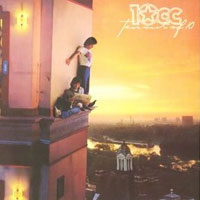
company wanted us to have
an American writer/producer,
I guess to lend it more of an
American influence, so it
would therefore sell morein
America. Well, that didn't work."
BE: And I guess the band Hotlegs is actually what begat 10cc…?
GG: Yeah, that's right. Well, Hotlegs was 10cc without me, but what happened was that they had a hit with "Neanderthal Man,” and were offered a tour with the Moody Blues, and they asked me…because that was done while I was away…and I went on the road with them. And rather than taking advantage of all they'd done there, they went on a holiday and just buggered about for awhile. And all that sort of faded. But we were still working together in the studio, doing backing vocals for people…kind of like the house band, house producers doing anything and everything. And for me and Eric, the interest was just to get us business in for the studio…which was quite a brave thing to do, to have a studio outside of London. There weren't that many. But there was a big TV company in Manchester…and still is, ‘cause that's quite near Stockport…and it became busier and busier. And, of course, once 10cc had their first hit, everybody was there.
BE: Were you surprised that 10cc became as big as they did in the U.S.? Because the band had a decidedly eccentric sound when they first began, and America has never really been known to embrace the unique.
GG: No, I've noticed! I wasn't surprised with our success in the UK and Europe, but…no, I wasn't really surprised. I think we all thought that everything we did was, y'know, wonderful and would sell loads of records! (Laughs) So that was that!
BE: When Godley and Crème left 10cc, I've heard it wasn't exactly what you'd call the best of circumstances.
GG: Well, it wasn't, because we were on a high, y'know, and suddenly half the team walks out…? We were not happy bunnies, I can tell you! However, Eric and I decided that we should carry on, after much soul searching and deciding on whether we had the… (Pauses) We had the legal right to the name, but, morally, when 50 percent of the team goes, the other ones shouldn't carry on…but we thought that we'd built things up, and why should we forgo a great name because the other people have decided to walk away? And that's what we did, obviously.
BE: Did you maintain a relationship with Kevin and Lol immediately thereafter, or did it take awhile?
GG: I always maintained a relationship with Kevin. I kind of…as much as I hated it when they left, I had a sort of grudging admiration for them, because they were pursuing what they really wanted and not retaining any rights to 10cc whatsoever. So I thought they were pretty brave. And very stupid.
BE: (Laughs)
GG: But Kevin and I, over the years, had always kept in touch, whether with Christmas cards or…we kept an eye on what each other was doing, so if something good happened, we'd always sort of make a call or drop a note to each other. We'd meet occasionally for lunch. But it wasn't until about four years ago that Kevin called me and said, "I want to do some music.”
BE: Yeah, I was gonna ask who approached who.
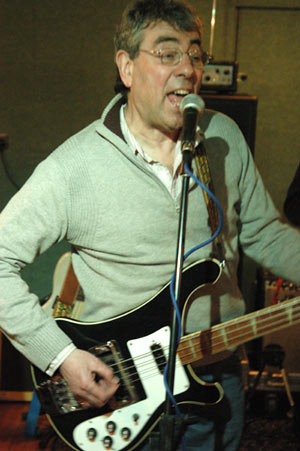 GG: Yes, well, he approached me, and I was delighted,
because I'd always loved his voice and his songwriting ability, particularly
his lyrics. He writes very different lyrics from me – I would never
do it, but I would love to do it like he does it – and he doesn't play
an instrument, so he needs somebody. Otherwise, he'd be in big trouble!
(Laughs) And, y'know, I said, "What's the idea? What's the
remit?” And he said, "There is no remit. Let's just do it.” And that
sounded like a good idea to me. So we got together, and it was all…it
was like riding a bike. Although we hadn't written that much in 10cc,
we still always got on. Some people you're like that with. We always
had a good relationship, and it was really great to be writing music
with him again. I really enjoyed it. It was kind of challenging as
well sometimes. What was good about it was that I knew what he was
thinking musically, but he couldn't interpret it…so I'm like his interpreter!
GG: Yes, well, he approached me, and I was delighted,
because I'd always loved his voice and his songwriting ability, particularly
his lyrics. He writes very different lyrics from me – I would never
do it, but I would love to do it like he does it – and he doesn't play
an instrument, so he needs somebody. Otherwise, he'd be in big trouble!
(Laughs) And, y'know, I said, "What's the idea? What's the
remit?” And he said, "There is no remit. Let's just do it.” And that
sounded like a good idea to me. So we got together, and it was all…it
was like riding a bike. Although we hadn't written that much in 10cc,
we still always got on. Some people you're like that with. We always
had a good relationship, and it was really great to be writing music
with him again. I really enjoyed it. It was kind of challenging as
well sometimes. What was good about it was that I knew what he was
thinking musically, but he couldn't interpret it…so I'm like his interpreter!
BE: I know there are five songs available for download and purchase from the website. How many more are in the works?
GG: Oh, a lot! A lot. We've actually started work on number six, and we have kind of a long-term plan, which is to finish another five or six, do an album, and…now, how we're going to do it, I'm not sure, but where there's a will, there's a way…to do some kind of gigs as well.
BE: Excellent!
GG: Yeah, because we think…well, this is what Kevin said to me once. He said, "This is the only way we're going to get new material out there.” I mean, I'm writing my own material, and I have my own sort of 10cc band, which is great, but, obviously, it relies on old material. And it'd be nice to get out there and do something fresh.
BE: Yeah, actually, I was going to ask about that, because I knew that you'd been touring under the name of 10cc featuring Graham Gouldman and Friends.
GG: Yeah, that's right, and it's been great. I've really enjoyed it. It's done very well. There seems to be more interest in 10cc now than there has been for years, and, y'know, I'm glad that I'm able to do it, because no-one else wants to either tour in this sort of version or do it. So I'm the only one doing it, and it's been very good.
BE: And there's been no problem from any of the others with your using the name?
GG: Uh, no, and I wouldn't use the name 10cc in isolation. That wouldn't be right. But, no, I've had…I don't have a problem with any… (Pauses) I've not received any writs yet, let's put it that way!
BE: Actually, I was curious about the (1992 10cc reunion) album, …Meanwhile, because I don't think it ever came out in the States. I've never heard a single song from it…
GG: Right…
BE: …but I understand it was as much of a contractual obligation as a proper reunion.
GG: Absolutely. It's not something I'd recommend. It started off very well when we were writing it and gradually disintegrated into… (Hesitates) I can't listen to it.
BE: That good, huh?
GG: No, it's not that good. You shouldn't do things because of obligation; you should do them because you want to do them. When we were doing it…like, at the beginning, when it started, in particular…the writing was very great. I really enjoyed it. But the producer (Gary Katz) wasn't quite what we expected, and I think that was really the main cause of the trouble. I mean, Eric was very, uh, not happy at all about it, and I was more a kind of "oh, come on, we can make it work” sort of thing. But, eventually, it became obvious that it wasn't going to happen.
BE: Was that co-write with Paul McCartney ("Don't Break the Promises”) a song that was rescued from the Press to Play writing sessions that Eric had done with McCartney?
GG: Yes! It was!
BE: That's one of my favorite unheralded McCartney albums. I always liked those collaborations.
GG: Yes. A very, very good album.
BE: Now, you've released three solo albums over the course of your career…and, in fact, The Graham Gouldman Thing is one of my all-time favorite albums of the ‘60s.
GG: Oh, thank you! That album's actually going to be re-released.
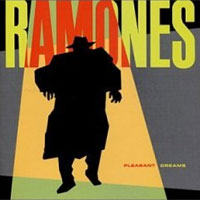
"On working with the
Ramones:
"I had a preconception of what
it was going to be like
to work
with them, but they were
fastidious, they were
conscientious,and I had a great
time. And Joey was charming."
GG: There's gonna be another one. They've re-mastered it, and I'm actually going to go through all the liner notes with a guy called Andy Morton, who's done some new liner notes, and that's gonna be quite nice. There's loads of them; it's almost like a mini-biography. So that's good. Yeah, y'know, and funnily enough, my daughter was just showing me some "Animalympics” stuff on YouTube! (Hesitates) Or MySpace. I can't remember. I always get YouTube and MySpace mixed up. Just goes to show you how up to the minute I am with everything. But, you know, it's great that all that stuff's out there.
BE: Yeah, actually, I asked one of our Senior Editors if he had any questions for you, and the first one out of his mouth was, "When is ‘Animalympics' coming out on DVD?”
GG: Well, good question. I've got quite a lot of the masters, because there never was a CD, but there has been an ongoing discussion between my manager and Steven Lisberger, who directed. I suppose there is a sort of underground interest in it, but I don't know if it warrants a release on DVD.
BE: Every four years, I keep hoping they're going to release it in conjunction with the Olympics.
GG: Well, that would be nice! Unfortunately, it came out when America pulled out of the Olympics, because it was in Russia…which was not good luck.
BE: Oh, I actually had a couple of questions about The Graham Gouldman Thing.
GG: Ah, okay.
BE: I've heard that Peter Noone (of Herman's Hermits) was supposed to co-produce, but he only showed up for the first session and then never showed up again.
GG: That's correct.
BE: What was the story on that? Did he not realize that he was supposed to come back?
GG: I just…I don't know why. I never asked him why he just never came back. What happened was that it was myself, John Paul Jones, and Eddie Kramer, and…we were just fine and dandy! (Laughs) Y'know? We were just, "Okay, here we go, we'll just carry on.” And we were very happy.
BE: I'd heard that one of the reasons you were happy to do a solo album was that you wanted to work with John Paul Jones.
GG: Well, I'd worked with John Paul Jones prior to doing that album. I'd been working with him on demos and various other records, and we'd worked a lot together, so I asked him to do the arrangements, and, y'know, he had a lot of influence on that album. I mean, his arrangements are amazing.
BE: Have you maintained a friendship with him over the years?
GG: I haven't seen him…the last time I saw him was at Mickie Most's funeral, which must've been about three or four years ago. But I did ask him to do…10cc were going to do a television special, and I asked him to be the musical director, and he'd agreed to do it, but it never happened. But he's someone I'd be very happy to work with at any time, because he was part of my…he was quite a big influence on me as a bass player, as well as everything else.
BE: I'm also a big fan of your work with Andrew Gold, as Wax (UK).
GG: Yeah. Well, Andrew and I, we're good buddies. In fact, I saw him quite recently, and we're talking about doing another Wax album…if there's… (Laughs) Y'know, we know a record company that will definitely put it out; it's a matter of us making the thing. So the plan is that, all being well, later in the year, he's going to come over, and we're going to do some writing. ‘Cause I love working with Andrew.
BE: I still remember the video for "Bridge to Your Heart.”
GG: Ah, yeah, that was very good, wasn't it?
BE: Yeah, definitely.
GG: Yeah, I think that the ‘80s, with him, was actually one of my favorite times, because 10cc had finished and I wasn't sure what I was doing, and he was, like, the ideal partner.
BE: You first worked with him on a 10cc album, didn't you?
GG: That's right, that's how I met him. Because our American record company wanted us to have an American writer/producer, I guess to lend it more of an American influence, so it would therefore sell more in America. Well, that didn't work, but the actual chemistry between us worked very, very well, and the three songs that Andrew worked on with me and Eric as co-writer and co-producer were all singles. Those three were the only three singles from that particular album (Ten Out Of 10). So it shows that something was working right.
BE: What inspired you to work together on a full project?
GG: Well, when 10cc split up, which was in the early ‘80s, I called Andrew up and said… (Affects a nasal American accent) "What're ya doin'?” And he said, "Nuthin'.” Well, he wasn't doing that much. I think he was doing stuff. But we'd sort of kept in touch with each other, and I've got a little studio, a 16-track studio at my house, and I said, "D'ya wanna come over, maybe do some writing, and see what happens?” And we did. He did. And he stayed for about six months.
BE: (Laughs)
GG: And it was great! I had a nice cottage in the country, and he loved it. It was just great. Everything was right for him, it was right for me at that time. And that resulted in an album. We just kept recording and recording, and it was great. A couple of singles came out from it, which weren't hits, and the album was never released until a few years ago, when it was released by Dome Records. It's called Common Knowledge, and you should check that out, because although we had the chart success later on, the Common Knowledge album actually contains, to me, the most creative work. But the other albums are very, very good as well. But I guess it's because we made it on a 16-track machine with one synthesizer and four guitars and one bass guitar. It was all very simple, y'know? That's why I liked it. And it was done in a house, which always gives it a special quality. (Laughs) But, yeah, we did three albums in the ‘80s, and then the Common Knowledge album came out a few years ago…and there've been other bits-and-pieces albums that Andrew's put out.
BE: Yeah, I'm his friend on MySpace, and he regularly does a lot of updates on his blog…
GG: Oh, right!
BE: …and he talked about you two getting together again. Now, your most recent album, And Another Thing, has a co-write on it that really interests me: "There Was A Day,” written by you, Chris Difford from Squeeze, and Suggs, the lead singer of Madness.
GG: Right.
BE: How did you guys meet up? I know that Chris has participated in a songwriting camp, though I don't know if it's his or…
On collaborating with Gary Barlow of Take That: "I always knew he was a great writer. I knew his songs. The fact that he was in a boy band was irrelevant. And working with him, he was very good, you know, just a natural writer." GG: That's right. Well, we met at a songwriting camp; it was his, but it was one instigated by EMI Music Publishing, and what happened is that there are 15 writers, and every day you write with two other writers. And the two writers on that particular day were Chris and Suggs. And Suggs came up with this title, "There Was A Day,” and that was it. We were off and running. And I had this sort of guitar chord…I had this sort of guitar figure, and we just sort of ran that.
BE: Had you been a fan of Squeeze and Madness?
GG: Uh, yes. Moreso Squeeze than Madness. I just liked a lot of the songs that Squeeze did. But I liked Suggs a lot. He was a great character. Those things are very good. I had a cover with Joe Cocker, an album track ("Soul Rising”) that I wrote with a couple of other people. I met Kirsty MacColl…although the writing day that we did was not very good. The third party…'cause it's always three of you…was on a completely different wavelength. But we did actually strike up a friendship and work together after that.
BE: I'm still in mourning over her death. She was just great.
GG: Yeah, so am I. I often…I mean, no time is good, but she was …I don't really know, but she had started a new relationship, she was very happy in her personal life, the Tropical Brainstorm album got fantastic reviews. It was a wonderful album, and it was, like, "Wow, this is a whole new beginning!” And… (Pauses, sadly) …it was just dreadful.
BE: I saw her perform at the Fleadh in Finsbury Park in 1992, when I was over in the UK for a visit, and she was just fantastic live.
GG: Yeah, yeah. She was a great talent. A great talent.
BE: You wrote a few songs with Gary Barlow, too.
GG: Yeah!
BE: Did you already know of him from his work with Take That?
GG: Yeah, of course I knew him from Take That! (Writer's note: I was perhaps being a bit naïve to even ask the question in the first place. Although they were little more than a musical footnote here in the States, with their only hit of note being "Back for Good,” Take That have scored no less than ten #1 hits in the UK.) I'm trying to think how we actually got together. I think it was through our publisher that we were put together…and we were actually supposed to be writing not that long ago, but they decided for Take That to go on the road again. (Laughs) I don't know if you really know about the reunion…but I guess you do. But it was such a phenomenal success, so they're just going to keep doing it for the time being.
BE: Did his songwriting acumen surprise you at all, given that he was pigeonholed as having come from a "boy band”?
GG: No, not at all. I always knew he was a great writer. I knew his songs. The fact that he was in a boy band was irrelevant. And working with him, he was very good, you know, just a natural writer. I write with lots of people, and you can tell pretty much right away that, y'know, some people got it, and some people ain't.
BE: (Laughs)
GG: I mean, they can be very good writers, but who cares about very good? It's got to be absolutely… (Hesitates) It's almost like great isn't good enough anymore. And I've always liked collaborating. It always brings out good stuff in me. Otherwise, I have to be really inspired to write on my own. I write lots of bits of pieces that I kind of bring to the party when I'm writing with someone else, but… (Trails off)
BE: Okay, I've just got a few more, and then I'll let you go.
GG: Okay.
BE: You also produced the Ramones' Pleasant Dreams album.
GG: Yeah.
BE: How did that come about?
GG: (Long pause) That's a very good question. I'd been doing quite a lot of production, actually, in the early ‘80s, and this was a period where…I think it was '79, and 10cc was supposed to go to Australia and Japan on tour, and Eric Stewart had a very, very bad accident, which actually put him out of action for a year. And I think I just started looking for a thing to do! (Laughs) And one of the things was Animalympics, and the other thing was when someone said, "You've been approached by the Ramones. They want to do an album with you.” I don't even know how it came about. And the first thing I thought was, "Why? Where's our sort of…connection?” And they said, "Well, it's that our influences are from the ‘60s…” They loved the Yardbirds. "…and we think we sort of write similar songs.” And I thought, "That isn't quite right.” But I said to them, "Well, look, our sensibilities are from the same place, even though they manifest themselves in different ways, I think…” (Laughs) "…but I think that it's such an off-the-wall idea that I think it's best for us all that, rather than just plunge into doing a whole album, we just do two or three tracks and see what happens.” Anyway, it worked! And, y'know, we liked each other, and we did the album. And then we did all the tracks in New York, and Joey came over to Stockport, to Strawberry Studios, to do the vocals. And it was great.
BE: I don't know if you remember, but I dropped you an E-mail a few weeks ago about how, in our weekly Mix Disc Monday feature, I cited "It's Not My Place (In The 9 To 5 World)” in my disc of songs from 1981.
GG: Oh, that's right, so you said.
BE: It was a song I hadn't really paid a lot of attention to until Rhino put out an anthology of the band's work and it showed up on there, but I'd forgotten what a great song it was until recently.
GG: Well, I was interested, because of the internet, to look at some of the reviews, and a lot of people loved it and a lot of people hated it…which I suppose is a good thing. Nobody seemed to be indifferent to it! So there you are. But, no, it was an unusual thing to do, but I noticed that…I don't know whether people knew, because it was me, that they thought it was a bit soft and a bit poppy. But I didn't write their songs; I was just guiding them from the control room! But, anyway, I enjoyed the experience. And contrary to what I…I had a preconception of what it was going to be like to work with them, but they were fastidious, they were conscientious, and I had a great time. And Joey was charming.
BE: Lastly…and this is probably more or less one of those impossible questions, but you've probably been asked it enough that you might have a stock answer…what's your favorite interpretation of one of your compositions?
GG: (Instantly) I can answer that! I loved Chris Isaak's "Heart Full of Soul.”
BE: You know, so do I. And, actually, his (self-titled) album was the first place I'd ever heard the song!
GG: Really? Well, it could've been written for him.
BE: Oh, yeah, I thought it was a fantastic version.
GG: Yeah, really good. And I was a big fan of his. And I was really kind of chuffed… (Laughs) …when I heard he'd done it. And I really did like it a lot. He's great. I don't know what he's doing now…
BE: I believe he's touring with Stevie Nicks right now, as her opening act.
GG: Oh, really? Great. I like him a lot.
BE: Well, I believe that's it. It's been an extreme pleasure speaking with you…
GG: Okay!
BE: Oh, actually, one more question, and this'll bring it all full circle: was any of The Mockingbirds' material ever released on CD?
GG: Only on, like, compilations. Unfortunately… (Laughs) …there's no Mockingbirds' Greatest Hits! So there's no undiscovered gems, no.
BE: Great. Thanks again, Graham.
GG: Okay, very good. Nice to meet you!








